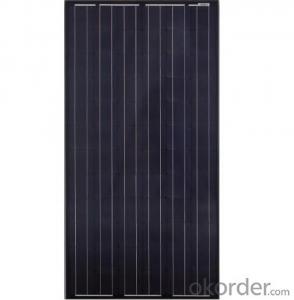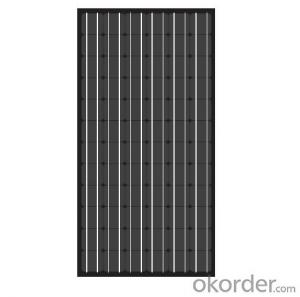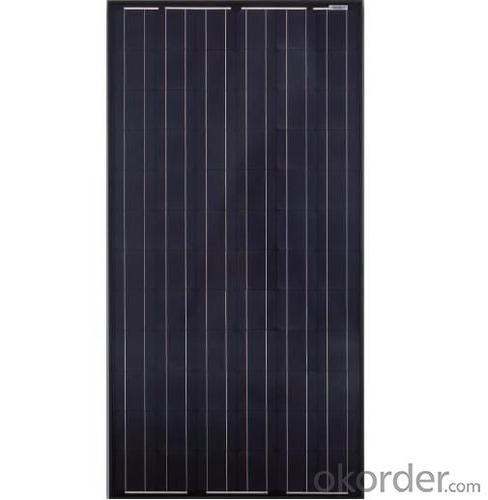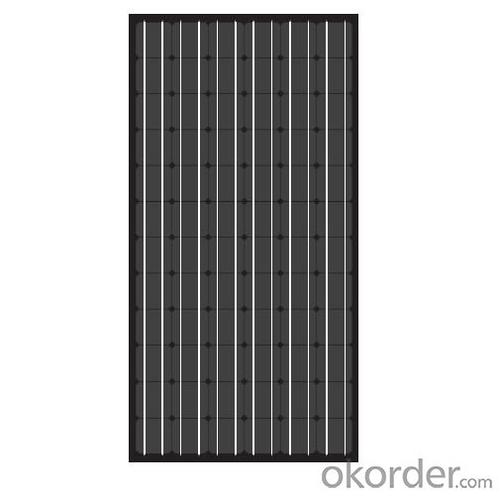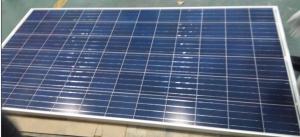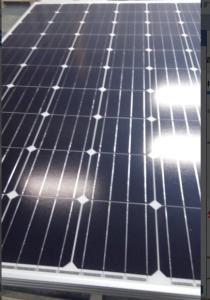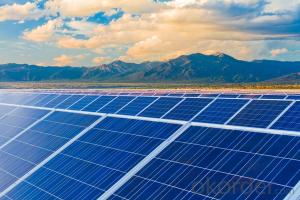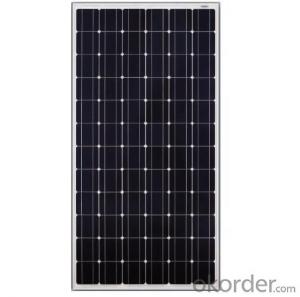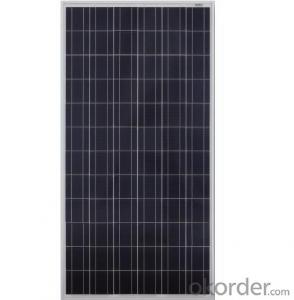Grecell Solar Panels Monocrystalline Panel Jam5 (L)(BK) 72 190W
- Loading Port:
- Shanghai
- Payment Terms:
- TT or LC
- Min Order Qty:
- 360 watt
- Supply Capability:
- 100000 watt/month
OKorder Service Pledge
OKorder Financial Service
You Might Also Like
JAM5 (L)(BK) 72 190W MONOCRYSTALLINE SILICON MODULE
Key futures:
Aesthetically apealing design with black frame and backsheet especially suited for rooftop and utility applications.
Anti-reflective and anti-soiling surface reduces power loss from dirt and dust;
outstanding prformance in low-light irradiance environments;
excellent mechanical load resistance:certified to wothstand high wind loads (2400pa)and snow loads(5400pa)
high salt and ammonia resistance certified by TUV NORD
Datasheet:
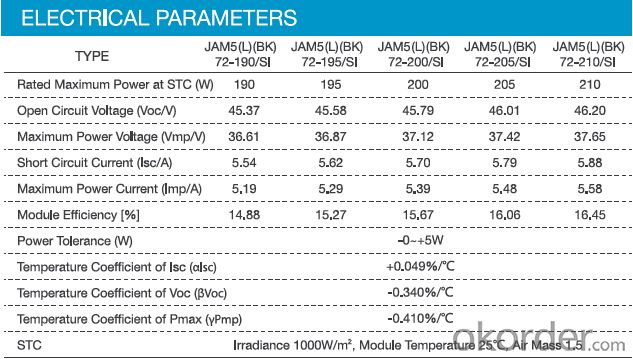
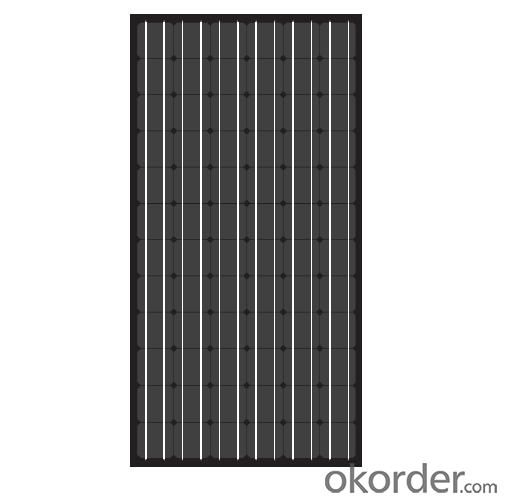
FAQ
1.How do I protect my solar system during subzero temperatures?
If you have a system that is operating in areas with subzero temperatures then freeze protection must be implemented. The easiest means of preventing freezing is to use a controller with a low temperatures setting, so when the manifold temperature drops below a certain pre-set temperature (5oC/40oF), the pump will circulate, warming the collector with water from the bottom of the storage tank. The pump will not run continually, just periodically, the frequency of which will depend on the outside temperature. In extremely cold areas, a closed loop using a glycol/water mix may be appropriate.
2.Will water be heated on a cloudy day?
Yes. Although the heat output of the solar collector is reduced on overcast days it will still be able to provide heating. If it is a heavily clouded day or raining, then more gas or electric boosting may be required to maintain water at the required temperature. This system will be automated so you don't have to worry about running out of hot water on a rainy day.
- Q: How do solar panels reduce carbon emissions?
- Solar panels reduce carbon emissions by generating electricity from sunlight, which is a clean and renewable energy source. Unlike fossil fuels, solar power does not produce any greenhouse gas emissions or pollutants during operation. By replacing traditional energy sources, such as coal or gas-fired power plants, with solar panels, we can significantly reduce the amount of carbon dioxide and other harmful emissions that are released into the atmosphere, helping to mitigate climate change and improve air quality.
- Q: Can solar panels be installed on camping sites?
- Yes, solar panels can be installed on camping sites. They are a great renewable energy option for powering small electronic devices, lighting, and charging batteries while camping.
- Q: Can solar panels be used to power a bank?
- Yes, solar panels can be used to power a bank. By installing solar panels on the roof or surrounding areas of a bank, the generated solar energy can be used to power various operations within the bank, including lighting, heating/cooling systems, computers, ATMs, and other electrical equipment. Additionally, excess solar energy can be stored in batteries or fed back into the grid, providing a sustainable and cost-effective solution for powering a bank.
- Q: Can solar panels be used in areas with high levels of air turbulence or strong winds?
- Yes, solar panels can be used in areas with high levels of air turbulence or strong winds. However, it is important to ensure that the solar panel installation is designed to withstand such conditions. Proper anchoring and mounting systems, as well as reinforced frames, can help secure the panels and prevent damage or displacement due to wind forces. Additionally, selecting wind-resistant solar panel models can further enhance their performance and durability in such environments.
- Q: Can I make a solar panel at home?How to make it?
- It's not necessary. The time, materials, energy, and money you have to put out might not be worth it. Being this is your first unit, there are cheap enough panels; you should shop around. OKorder alone with an array of selections and there is Home Depot and others. When solar panels not hooked up correctly or you don't have the right equipment you can cause the batteries to explode. Do your research there's plenty on Youtube. I'd read the answers here but you really need to do some homework elsewhere. It is that serious that I wouldn't give any advise on the how to.
- Q: I'm making a model of a solar photovoltaic tower for a school project. I need a way to store energy, and we thought about using capacitors (mainly because of our somewhat limited funding). The tower will have a small photovoltaic panel (around the size of a laptop keyboard with number pad) and some (around 50) quot;heliostats(just the mirrors, no moving parts). What kind of capacitors should i use? and would a capacitor bank be better? i am getting confused with all those uF, pF and can't see the difference.Thanx in advance
- Solar Capacitor
- Q: Can solar panels be installed on a pole or ground mount?
- Yes, solar panels can be installed on both poles and ground mounts. Pole-mounted solar panels are typically used in situations where there is limited space or when the panels need to be elevated for better sunlight exposure. Ground-mounted solar panels are commonly used in larger installations or when there is ample available land. Both options offer flexibility in placement and can effectively harness solar energy.
- Q: Can solar panels be installed on a hotel or hospitality facility?
- Yes, solar panels can be installed on a hotel or hospitality facility. In fact, many hotels and hospitality facilities are adopting solar energy as a sustainable and cost-effective solution. Solar panels can be installed on the rooftops, parking lots, or any available open space to generate clean and renewable energy for the facility's electricity needs. This not only reduces the carbon footprint but also helps in saving on energy bills in the long run.
- Q: Me and my friend have made our own functional solar panels for considerably less than retail prices and we are thinking about selling them. Are there any legal issues regarding this? Would I need any special licenses or anything? Would using brand name components or parts in the panels make any difference legally? I want to know before I just go out and start doing it. Thanks!
- Would those be heating panels, or electric panels? If the latter, you would not have any safety certifications (I assume), so the panels would be illegal to use for a serious, grid-tied system. You would need to make this clear to your customers, that they could only connect to stand-alone systems. If this is in the US, there is always some finite danger of lawsuits if your product is defective. If the water heater leaks or blows up on someone's roof, you might have to go to court to defend yourselves. Even if you disclaim all warranties, in some states, if you sell something as a water heater then it has to heat water reasonably, and also not be hazardous. In other words, fit for its purpose. Check your local laws.
- Q: I need to know where I can buy the parts or find them as scrap to make my own solar panels. Is there a cheap way of buying the panels or can I make them myself.
- You can buy a box broken cells and solder them together and save big bucks.
Send your message to us
Grecell Solar Panels Monocrystalline Panel Jam5 (L)(BK) 72 190W
- Loading Port:
- Shanghai
- Payment Terms:
- TT or LC
- Min Order Qty:
- 360 watt
- Supply Capability:
- 100000 watt/month
OKorder Service Pledge
OKorder Financial Service
Similar products
Hot products
Hot Searches
Related keywords
